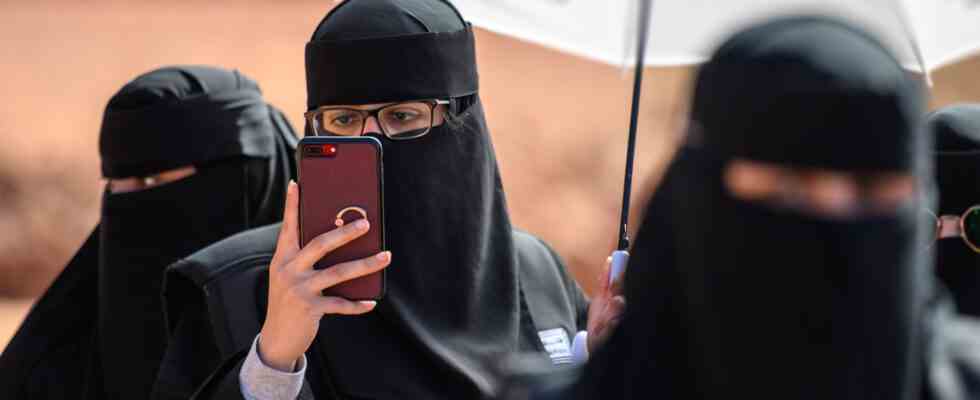Status: 09/20/2022 03:40 a.m
34 years in prison for a few tweets – this verdict in Saudi Arabia caused outrage around the world. Denutiation is very easy in the kingdom: with an app that also raises questions for Apple and Google.
Salma al-Shehab has two sons. The two little ones are four and six – the next time they see their mother, they will probably be 38 and 40 years old and maybe already have children of their own. Salma al-Shehab was recently sentenced to 34 years in prison by a Saudi court. Because of some tweets that probably wouldn’t have been noticed if a Twitter user hadn’t reported them.
Al-Shehab was reported to the authorities via an app; an app for everyone under the name “Kollona Amn” (which translates as “We are security”) is available for everyone in the Apple Appstore and Google Playstore.
“Assume the role of the policeman”
At first glance, the app seems quite harmless. The description says:
This app aims to enable every citizen in Saudi Arabia to take on the role of a police officer. To support the authorities, you can send photos, videos or a screenshot via the app.
In Germany, too, there have been apps for some time that citizens can use to help their cities and municipalities. You can report illegal parking or rubbish that has been illegally dumped somewhere.
But the problem is that the legal understanding is different in Saudi Arabia, says Mike Sexton. He works as a cyber security expert in Washington DC and warns against such programs. It would come across as something everyday, but the information would then be used primarily by the security services.
A 21st century dictatorship
The methods are nothing new, explains Sexton, who has observed this phenomenon scientifically. Authoritarian regimes used the same mechanisms – punishing dissenters and denouncing neighbors for a political statement. What changes is the respective technology.
Human rights activists repeatedly emphasize that the Saudi regime is no less brutal than dictatorships of the past decades – even if it is a dictatorship of the 21st century.
According to the US secret services, Crown Prince and de facto ruler Mohammed bin Salman ordered the killing of journalist Jamal Koshggis, who was critical of the regime. He was assassinated in the Saudi embassy in Istanbul in 2018. His body is said to have been sawn up and disposed of afterwards.
A signal to each and everyone
Before his death, Kashoggi had founded the organization “Dawn”. Its members are committed to human rights and democracy in the Near and Middle East. The scientific director of the human rights organization is Abdullah Alaoudh. He too fled from the Saudi regime to the United States.
“This app is clearly intended to spread fear,” says Alaoudh. It should send a message to all Saudi citizens: someone is always there and can report others.
Alaoudh is convinced that this leads to self-censorship, to no one daring to say anything anymore. Not even behind closed doors.
Tech companies need to react
The fact that the Saudi regime publishes such an app is one thing, say human rights activists. But the fact that this is freely available in Apple’s Appstore and Google’s Playstore is the real scandal, agrees Alaoudh.
One can only speculate as to why Google and Apple don’t simply remove the app from their stores. Neither Google nor Apple responded to a request.
Waiting for license
The fact is that Saudi Arabia invested billions in various Silicon Valley companies years ago. Apple, on the other hand, already put around one billion US dollars into the “Vision Fund” founded by Saudi Arabia in 2017 and has been trying in vain to gain a foothold in the Saudi market for years, but has not received a license to open Apple shops.
And according to the US NGO Tech Transparency Projects, Google has been pursuing an aggressive investment strategy in the UK for years. This is how the company came to contracts that are believed to be worth billions.
Human rights activists raise allegations
Google and Apple share responsibility, says Abdullah Alaoudh, “because they allow this app to exist at all. And so every arrest and every suppression of political protest is also their fault.” According to observers, Google and Apple should therefore be accused of being partly to blame for the conviction of Salma al-Shehab.
Her case has come under the spotlight largely because of the lengthy prison sentence she faced. But the app was launched back in 2016, so there could be many more cases like this one.
Human Rights Watch’s Rothna Begum fears the same thing. But potential victims see themselves under pressure from the regime. Their families might be “just too scared to go public. The number of unreported cases could be high – we just don’t know.”
At least one million downloads
The app has been downloaded at least a million times from the Google Playstore. There are no official figures for Apple’s App Store.
But it is clear that it is dormant on many smartphones in Saudi Arabia. Always ready to convey something to the authorities in Saudi Arabia – even if it’s just a harmless tweet.

